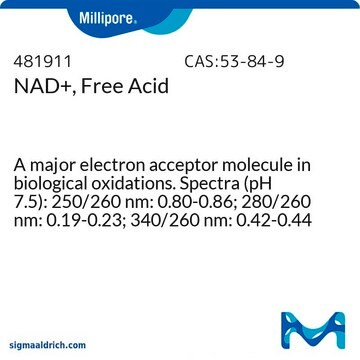20-221
NAD Cofactor
Can be used as a cofactor in reactions with NAD-dependent histone deacetylase enzymes.
Sign Into View Organizational & Contract Pricing
All Photos(1)
About This Item
UNSPSC Code:
41116012
eCl@ss:
32160405
NACRES:
NA.41
Recommended Products
Quality Level
form
solid
manufacturer/tradename
Upstate®
technique(s)
activity assay: suitable (histone deacetylase (HDAC))
NCBI accession no.
UniProt accession no.
shipped in
dry ice
Gene Information
human ... IDH3A(3419)
General description
Description: β-nicotinamide adenine dinucleotide hydrate
FW: 663.4
Use: Can be used as a cofactor in reactions with NAD-dependent histone deacetylase enzymes.
FW: 663.4
Use: Can be used as a cofactor in reactions with NAD-dependent histone deacetylase enzymes.
Legal Information
UPSTATE is a registered trademark of Merck KGaA, Darmstadt, Germany
Storage Class Code
13 - Non Combustible Solids
WGK
WGK 3
Flash Point(F)
Not applicable
Flash Point(C)
Not applicable
Certificates of Analysis (COA)
Search for Certificates of Analysis (COA) by entering the products Lot/Batch Number. Lot and Batch Numbers can be found on a product’s label following the words ‘Lot’ or ‘Batch’.
Already Own This Product?
Find documentation for the products that you have recently purchased in the Document Library.
Monoclonal antibodies to murine CD40 define two distinct functional epitopes.
A W Heath,W W Wu,M C Howard
European Journal of Immunology null
Biological activity of prostate-specific antigen isolated by sodium dodecyl sulfate-polyacrylamide gel electrophoresis and electroelution.
U Tessmer,T Quack,F Donn,A Leuner,R Dernick
Electrophoresis null
S J Shin et al.
Scandinavian journal of clinical and laboratory investigation, 56(6), 571-576 (1996-10-01)
To assess whether plasma and urinary endothelin-1 (ET-1) values are related to the severity of diabetic nephropathy, we measured plasma and urinary ET-1-like immunoreactivity (ET-1-LI) in 14 healthy subjects, and in 50 normoalbuminuric (group 1), 13 albuminuric (group 2), and
Activation of the CD3/T cell receptor (TcR) complex or of protein kinase C potentiate adenylyl cyclase stimulation in a tumoral T cell line: involvement of two distinct intracellular pathways.
C Bihoreau,A Heurtier,A Enjalbert,N Corvaia,A Bensussan,L Degos,C Kordon
European Journal of Immunology null
L Del Pozo et al.
European journal of biochemistry, 213(2), 849-857 (1993-04-15)
Two genes (SCR1 and SCR2) encoding natural cycloheximide resistance in the budding yeast Schwanniomyces occidentalis have been cloned by expression in Saccharomyces cerevisiae. Both genes determine resistance to the inhibitory action of cycloheximide on the ribosome, SCR1 and SCR2 are
Our team of scientists has experience in all areas of research including Life Science, Material Science, Chemical Synthesis, Chromatography, Analytical and many others.
Contact Technical Service




